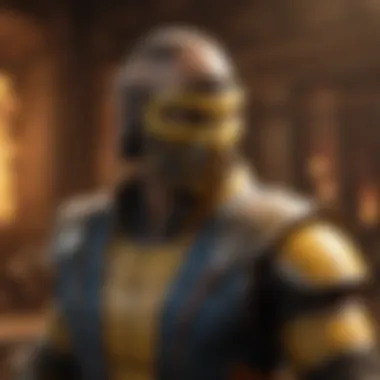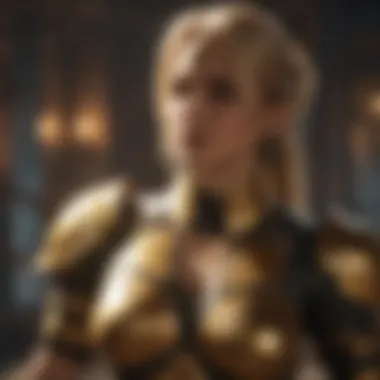The Role of Mercy in Mortal Kombat 11 Gameplay


Intro
The landscape of fighting video games has always been one of visceral excitement, filled with stunning combos, flashy fatalities, and fierce competition. But amid all the chaos, one element stands out: the concept of mercy. In Mortal Kombat 11, this mechanic does more than simply reflect a player’s choice; it embodies deeper themes that resonate in gaming culture. Understanding mercy isn’t just about mastering a move; it speaks to the very essence of strategy and morality within competitive play.
By examining mercy, we can see how it impacts not only gameplay but also player interactions and community discussions. It’s a fascinating dance between brutality and compassion — an exploration of how far one is willing to go in the heat of battle.
Mechanics of Mercy
What is Mercy?
In Mortal Kombat 11, mercy acts as a unique mechanic where players have the chance to spare their defeated opponent. Unlike other actions in the game, mercy allows a player to exhibit a form of empathy. This mechanic is triggered during the final moments of a match when an opponent is on the brink of defeat.
To perform a mercy, one must input a specific command sequence after dealing the final blow that would normally end the match. If executed correctly, the opponent is revived with a sliver of health left, leading to a second chance. It's a moment that can turn the tide of battle — a double-edged sword that can lead to victory or failure.
Timing and Strategy
Executing mercy is not just a matter of button-mashing; timing is crucial. Players must choose the precise moment to extend mercy, and this decision can heavily influence their overall strategies. It’s similar to playing poker; knowing when to play your hand and when to bluff is key.
- Changing the Game Dynamics: Performing mercy may unsettle an opponent who believes they have already clinched victory.
- Psychological Tactics: Sometimes, extending mercy can be a form of psychological warfare, forcing the opponent to rethink their strategy.
- Competitive Implications: In competitive play, the use of mercy serves as a powerful statement, one that can both rally a crowd and demoralize foes.
The Historical Context of Mercy
Origins in the Franchise
Mercy isn't a new concept in the Mortal Kombat series. Its historical roots delve deeply into previous titles where the notion of sparing a foe existed. The mechanics have evolved over time, but the essence remains intact. By understanding its history, we can appreciate its place in Mortal Kombat 11.
- Mortal Kombat 1: The original game introduced a variety of finishing moves but lacked the mercy feature.
- Mortal Kombat 3: Introduced the mercy mechanic, allowing players to revive their fallen enemies for a chance of redemption.
Evolution of Gameplay
The gradual evolution of mercy throughout the titles showcases the series' willingness to embrace new gameplay dynamics. In subsequent games, mercy became a symbolic act showcasing respect among fighters and players. It has transitioned from a simple gameplay mechanic to a form of player-to-player interaction, adding layers of emotional context.
Player Perceptions and Moral Dilemmas
Critical Perspectives
Mercy adds a philosophical dimension to Mortal Kombat 11. As players execute or forgo this option, questions arise about morality and honor in competition. Does extending mercy make a player weak, or does it demonstrate higher virtues? Critics often debate whether mercy is a tactical advantage or merely a distraction from the core goals of the game.
- Empathy vs. Survival: In the heat of the moment, does mercy betray the spirit of the fight?
- Community Views: Players often discuss their personal experiences with mercy in various forums on platforms like Reddit. Some see it as a noble act, while others believe it disrupts the flow of the game.
"In the end, mercy may just be a gamble, but perhaps it's the one gamble we’re all willing to take for a bit of humanity in our virtual battles."
Balancing Brutality with Empathy
As the debate continues, players often find themselves navigating a tightrope between displaying frivolity or seriousness while wielding mercy. The balance seems more complex than it first appears, and it echoes broader cultural explorations of violence in gaming. Is it possible to weave empathy into the very fabric of a combat game, or does it inevitably undermine the theme?
- Player Community Reactions: Engaging with other players may help shape one’s understanding of mercy.
- Personal Reflections: Each player’s experience is different, leading to unique interpretations of what mercy means within the game.
Closure
Mercy in Mortal Kombat 11 generates a rich tapestry of gameplay elements intertwined with emotional allure. As players take on different strategies, they negotiate not just their moves, but also what it means to show mercy in combat. This concept embodies a broader commentary on morality in gaming and poses challenging dilemmas that both professional gamers and casual participants must confront. By exploring mercy, we don’t just dissect a gameplay mechanic; we tap into a narrative that challenges our perceptions of competition, empathy, and respect.
Understanding Mercy in Mortal Kombat
In the expansive universe of fighting games, Mortal Kombat 11 stands out not only for its brutal combat but also for its unique mechanic known as "mercy." This concept brings a layer of complexity to the game, intertwining strategy, ethics, and the very fabric of competitive play. Understanding mercy is pivotal in unpacking not just how the game functions, but how it shapes the players' experience and interactions on multiple levels.
Definition of Mercy in the Context of Gaming


Mercy in gaming refers to the act of deliberately sparing an opponent’s life when they are on the brink of defeat. Unlike the overwhelming nature of many fighting games, where a fatality often seals a victory, Mortal Kombat 11 offers players the opportunity to extend the match. It’s a powerful tool that can shift the momentum of gameplay and is ultimately a reflection of the player’s intent. In this context, mercy embodies a paradox of empathy versus aggression, making it more than just a mechanic—it becomes a statement about how players engage with one another.
The nuance of mercy results in an intriguing dynamic. When a player chooses to execute a mercy move, they not only decide the fate of their opponent but also influence the psychological landscape of the match. At its core, mercy pushes the boundaries of typical game rules, challenging players to consider their values and the larger implications of their actions.
Historical Overview of Mercy in the Mortal Kombat Series
The concept of mercy is not a new addition to the Mortal Kombat franchise but has evolved significantly since its inception. Initially introduced in Mortal Kombat 3, mercy allowed players to grant a second chance to their opponent, offering a break from the relentless pace typical of fighting games during that era. As the series progressed, mercy became a symbol of both classification and creativity.
In Mortal Kombat 11, mercy has been reimagined with both flair and tactical significance. It acts as a homage to its roots while expanding the possibilities of combat strategy. Unlike earlier iterations, the 11th installment delivers a polished execution that perfectly complements the game’s overall tone. Players now can display mercy, not only as a grace note but also as a calculated move within the grand scale of competition.
To put it simply, the historical trajectory of mercy underscores its importance in Mortal Kombat’s narrative, linking the past with a present enriched by modern gaming sensibilities. The evolution from a simple functionality to a complex strategic option illustrates the ongoing development of player interactions and mechanics in competitive gaming.
"Mercy is more than just a game move; it reflects the player’s strategy and their understanding of the human element in competition."
In summary, mercy encapsulates a distinctive element within Mortal Kombat 11, deserving of attention for its strategic implications, historical roots, and the ethical questions it raises for players. Understanding mercy is key to engaging with the game on a deeper level, as it intertwines with the core gameplay while simultaneously introducing a rich psychological dimension.
Mechanics of Mercy
The mechanics of mercy in Mortal Kombat 11 adds a unique layer of complexity to gameplay. Understanding how to execute a mercy move effectively can differentiate a casual player from a more skilled competitor. This mechanic is not just a gimmick; it’s an intricate dance between strategy, psychology, and ethics. It stands as a testament to the game's commitment to offering players an experience that transcends mere button mashing and delves into the realms of player interaction, respect, and tactical considerations.
How to Execute a Mercy Move
Executing a mercy in Mortal Kombat 11 can be broken down into a few clear steps, but mastery comes with practice. To perform this move, the player must first ensure they have defeated their opponent, bringing about the finishing moments of a round. At this critical juncture, timing is everything. Instead of delivering the final blow, the player must input a specific sequence of commands—typically, a combination of buttons followed by movement—before the game prompts the next action.
- Perform a Finish Him/Her move: Ensure your opponent is in a vulnerable state, signaling that they have lost the round.
- Input the Mercy Command: Specific button combinations must be entered swiftly yet accurately. The commands are usually intuitive, depending on the player’s chosen character, and vary slightly across different characters within the game.
- Observe the Result: If executed correctly, the opponent will be revived, only to face the player's assaults again. This moment can be a double-edged sword—fueling either camaraderie or resentment, depending on the opponent.
Practicing mercy can enhance a player’s sense of timing much like attempting a flawless block. The ability to revive an opponent, or show mercy, echoes back to the several layers of tactical play that Mortal Kombat has cultivated over the years. Understanding these commands will also elevate a player’s versatility in various match situations.
Timing and Conditions for Mercy Activation
Timing and the environment within which mercy can be activated are pivotal. The mechanics behind mercy demand precise timing, making it more about timing than about technical skill alone. Each match in Mortal Kombat 11 has its own ebb and flow, and understanding when to show mercy can turn the tides of battle.
Mercy can only be activated under specific circumstances:
- The Round Finale: The player must defeat their opponent in a round, allowing the traditional finish prompts to appear on screen.
- Button Configuration: Each character supports different commands for mercy execution. Familiarity with one’s chosen character is beneficial in this respect.
- Fighter's Health State: Players should note that even the slightest miscalculation in timing can lead to accidental finishes, thus negating the mercy move.
To be successful, players need to develop a sense of situational awareness. An experienced player can often read the flow of the match, knowing when their opponent might be frustrated or resigned, making the mercy move feel impactful or even strategic.
"Mercy in Mortal Kombat transforms the game from mere combat to a psychological chess match—figuring out when to strike and when to hold back builds character beyond the hit points and fatalities."
Thus, the balance of mercy in gameplay lies not only in the execution but also in the surrounding circumstances, mood, and potential impact on both players involved. The right moment for mercy can lead to a mutual understanding, or it might escalate tensions, but that is the beauty of the mechanics at play in Mortal Kombat 11.
The Role of Mercy in Gameplay Strategy
In the intricate world of Mortal Kombat 11, mercy transcends being a mere gameplay mechanic; it emerges as a pivotal strategic element that players must consider. The decision to show mercy can ultimately shape the flow of a match, reflecting both on individual player tactics and broader implications for the competitive gaming scene. When utilized effectively, mercy serves not only as a form of psychological warfare but can substantially shift the balance of power in a match, granting players a significant advantage.
Psychological Impact on Opponents
Mercy, at its core, affects the mental state of both the player initiating it and their opponent. When one player decides to spare the other, several psychological layers unfold. For instance, being spared can lead to a cocktail of emotions ranging from gratitude to embarrassment. It’s akin to a hand extended after a fight; it carries weight. The spared player may feel a renewed sense of hope, urging them to fight back vigorously in an attempt to equalize the odds. This kind of psychological reset can fuel their determination to turn the tide.
Conversely, the player who shows mercy might experience a tactical advantage. By sparing their opponent, they often plant seeds of doubt. The question looms: "Why did they let me go?" This doubt can manifest as hesitation; a moment’s uncertainty, where the spared player re-evaluates their approach. A thought that runs through many minds is, “Am I being set up for a counter?” This inner turmoil can distract a player at critical moments, steering them away from focused gameplay.
Interestingly, mercy can even foster a sense of humility in players. It may remind them that while fighting games often revolve around dominance, there's a nuanced beauty in showing compassion when the opportunity arises. This may lead to an enhanced rivalry, as players seek to prove their worth after having been shown mercy.
The Tactical Use of Mercy in Competitive Matches
In the realm of competitive play, mercy can serve as a double-edged sword. A player not only needs to consider when to execute mercy but also how it will affect their standing in the match. Timing is of the essence; executing mercy at the right moment can catch opponents off-guard and can transform the entire momentum. For example, when a player is on the brink of victory, deciding to spare their opponent may lead them into a false sense of security, allowing for a well-timed counterattack later.


Moreover, mercy can be a strategic distraction. Players who are skilled at reading opponents can exploit mercy as bait. By showing compassion, they can lure their opponents into making hasty, aggressive decisions, which can be capitalized on for a quick victory.
The implications extend beyond the individual match as well. In tournaments, players often watch each other’s games closely. A player who frequently uses mercy may cultivate a reputation, and this plays into the strategic depth of their matches. Opponents may start to second-guess their own plans, not knowing if they will be met with mercy or the harshness of a relentless attack.
Ultimately, the role of mercy in gameplay strategy unfolds into a rich tapestry of decisions where every choice has the potential to influence the game's outcome. Decisions around mercy often require players to balance their instincts with strategy, empathy with dominance. As such, understanding its role is instrumental for any gamer aiming to excel in Mortal Kombat 11.
Mercy and Player Ethics
In the world of Mortal Kombat 11, mercy is not just a simple gameplay mechanic; it delves deep into the ethics of player interaction and the implications of choices made during a match. The act of showing mercy can spark heated debates among gamers, raising questions about morality, fairness, and even the continuation of rivalry. By bringing mercy into the equation, the game demands that players confront their own values and ethical stances. Are we simply here to crush opponents, or do we allow moments of compassion in the heat of battle?
Moral Implications of Showing Mercy
Mercy is a reflection of a player's ethics. When you choose to spare your opponent, it can feel like a powerful statement, akin to throwing a life-preserver to someone adrift in a sea of defeat. On a deeper level, this single action can embody various moral principles, ranging from empathy and sportsmanship to arrogance or even condescension.
- Empathy vs. Dominance: Showing mercy can stem from an understanding of your opponent's struggles. This sentiment could foster camaraderie among players, encouraging a nurturing environment. Conversely, if mercy is perceived as a display of dominance or superiority, it can be seen as belittling. The subtle line between mercy as kindness and mercy as derision often depends on the context and player intent.
- Personal Values: A player's background and gaming philosophy can influence their decision to show mercy. Some might hold a strong belief in fair play and ethics, viewing mercy as a natural extension of their values, while others treat it more as a tactical decision, weighing the worth of mercy against game-winning achievements.
- In-game Dynamics: The way mercy is incorporated into the combat system raises questions about its impact on gameplay. The balance between brutality and mercy plays a pivotal role in how players express their identities within the game.
"Choosing to show mercy might transform a mundane match into a narrative experience, where both players walk away with their dignity — but it also reflects on the character of the player."
Player Reactions to Mercy Usage
The responses to mercy can vary wildly among players, reflective of the diverse gaming community. Some embrace mercy as a noble act, while others perceive it as a handicap that disrupts traditional competitive flow.
- Positive Responses: Players who appreciate mercy often find it enhances the gameplay experience. It encourages unexpected twists, allowing for improvised narratives that can make matches memorable. For these players, mercy adds depth to the competitive aspects of the game and creates opportunities for social bonding.
- Critical Responses: On the flip side, certain gamers feel that mercy undermines the competitive integrity of Mortal Kombat. They argue that it disrupts the established rhythm of fighting games that rely on straightforward combat, embracing victory as the ultimate goal, rather than shared experiences.
- Mixed Feelings: There are also those caught in between. While they may respect the gesture of mercy, they wrestle with its implications — does it dilute the intensity of the game? Do they take their opponents for granted when they show mercy? This mixed reception shows that mercy in Mortal Kombat 11 is not just a gameplay mechanic, but an exploration of the psychological landscape of competitive gaming.
Ultimately, mercy in the context of Mortal Kombat 11 serves as a platform through which players can reflect their moral compass while navigating the intricate web of competitive ethics. The multifaceted nature of mercy allows it to resonate differently, sparking discussions that accentuate the emotional and ethical dimensions of gaming.
The Balance Between Brutality and Mercy
In the fierce battlegrounds of Mortal Kombat 11, the clash between brutality and mercy isn’t just a thematic backdrop; it’s the crux of the gameplay experience. Players engaging in the visceral actions of fighting must also grapple with the choices that define their moral compass. This balance shapes strategies and alters perceptions, enhancing the emotional weight that each match carries. Understanding this dynamic is essential, as it affects not only the enjoyment derived from the game, but also how players relate to one another on and off the battlefield.
Contrast with Traditional Fighting Game Elements
Typically, fighting games glorify aggression and relentless competition, valuing victories carved from the bones of defeated foes. Yet, Mortal Kombat 11 introduces mercy as a counterbalance, creating an intriguing juxtaposition. Where’s the fun in simply wiping the floor with every opponent? The introduction of mercy moves invites a rethink of tactics.
- Aggression vs. Compassion
Instead of going for the kill, players can choose to showcase compassion, throwing their opponents a lifeline. This strategy benefits not just the mercy-giver but also provides a more nuanced gameplay experience for the opponent, allowing for unexpected comebacks. This shift enables a broader spectrum of player engagement, creating memorable moments steeped in camaraderie and sportsmanship.
Players recently discussed this shift on forums like Reddit, highlighting how mercy can lead to thrilling second chances, adding an unforeseen layer to intense matches.
- Competitive Dynamics
In tournaments, traditional elements often focus on dominance and showcasing skill through brute force. Still, the inclusion of mercy can flip the script, leading to unexpected twists and altering the momentum significantly. A player is faced with the decision: to crush or to show grace can often mean the difference between a regretful victory and a moment of personal triumph.
Mercy as a Vehicle for Narrative Depth
Mortal Kombat has always been a franchise that marries combative gameplay with rich storytelling. Mercy doesn't merely function as a gameplay mechanic; it weaves deeper narratives. By incorporating mercy, players create their own stories—a flavor of redemption or a contrasting tale of chance forgotten.
- Player Narratives
When a player extends mercy, they’re not just playing the game; they're enacting a story. This is particularly potent for character arcs. For instance, imagine a hardened warrior facing a significant foe yet choosing to spare their life. This act can ripple through the character's storyline, shaping future encounters and rivalries. - Moral Choices
Faced with the decision to brutally finish off an opponent or show mercy, players engage in a deeply personal moral dilemma, mirroring real-life ethical questions. This layered complexity not only enriches gameplay but also invites players to reflect on their own values and choices, making every battle a canvas for individual expression.
"In Mortal Kombat 11, sometimes it's not just about winning; it's about how you choose to win."
Ultimately, the interplay of brutality and mercy in Mortal Kombat 11 serves to elevate the game beyond mere competition, fostering deeper connections between players and enhancing their overall experience.
The Community's Perspectives on Mercy
When we talk about mercy in Mortal Kombat 11, we can't ignore the broader conversations happening within its community. Gamers, whether casual or competitive, often share their views on what mercy signifies in the context of this brutal yet emotionally layered franchise. Engaging with these perspectives not only enriches our appreciation of the mechanics but also unveils the cultural significance that mercy holds among players.
The community around Mortal Kombat 11 has been vibrant and vocal. Players have taken to various platforms like Reddit and Facebook to express their opinions, share gameplay experiences, and even debate the ethics of mercy as a game feature. Each post, whether a casual remark or a heated discussion, contributes to a larger dialogue about how mercy shapes player interactions.
Fan Forums and Discussions


Fan forums have become lively arenas for discussing mercy, often filled with insightful takes and passionate arguments. Whether on platforms such as Reddit or dedicated Mortal Kombat forums, players dissect every angle. Some players view mercy as a tactic, a psychological play intended to instill doubt in opponents, while others see it as a gesture of respect and sportsmanship.
- Some key points around mercy discussed among fans include:
- Sportsmanship vs. Strategy: Is showing mercy simply a sign of good sportsmanship, or is it a strategic move to throw off an opponent's game?
- Diverse Reactions: Different players react to mercy moves in unique ways. Some might feel uplifted, thinking the opponent is being magnanimous, while others see it as a tactical error, leading to their comeback.
- Cultural Significance: Mercy has also been discussed in the context of broader gaming culture, with some players comparing it to similar elements found in other competitive games, such as FIFA or League of Legends, where players sometimes let opponents make a comeback.
The cloud swirling of opinions in these forums gives players a chance to interface with each other, share their gaming philosophy, and even refine their own gameplay styles based on what they rotate through in conversations.
Influence of Streamers and Content Creators
In the age of digital media, streamers and content creators wield significant influence over how mercy is perceived within the gaming community. Their gameplay sessions often showcase mercy moves, strategies, and even their personal principles regarding this element of combat.
These content creators usually engage with their audiences live or through edited videos. They might demonstrate how a well-timed mercy not only flips the tables but also establishes a certain mind-gaming dynamic. Examples include:
- Twitch Streamers: Many popular streamers, like Maximilian_DOOD, highlight the importance of mercy in their streams. They'll use mercy moves as a way to interact with their audience, showcasing techniques and discussing the reactions it garners.
- YouTube Tutorials: Creators often produce tutorials and strategy videos emphasizing mercy, where they break down not just the mechanics but also the psychological aspects of using mercy in matches. This helps players think about the why behind their choices, not just the how.
Moreover, streamers act as role models, influencing newer players in how they engage with mercy in their own games. As viewers witness seasoned players utilize mercy, the idea becomes less than a peculiar option and more of an expected play when conditions are right.
Mortal Kombat 11 isn't just about fighting; it’s about how we choose to fight, and, very often, the message is conveyed through mercy.
Mercy as a Competitive Mechanic
In the competitive landscape of Mortal Kombat 11, mercy serves more than just an aesthetic flourish or a narrative touch. It becomes a pivotal aspect that can transform the flow of a match, influencing both strategy and gameplay dynamics. As players mix skill and tactical ingenuity, the decision to use mercy can skew the trajectory of a match, making it a double-edged sword with substantial weight. The complexity of managing mercy effectively entails careful consideration, with rewards that can fluctuate between triumph and downfall depending on the player's choices.
Impact on Tournament Rules and Formats
The inclusion of mercy within tournament settings prompts a necessary discourse on its implications and ramifications. Many competitive arenas have absorbed this mechanic into their rule sets, understanding its potential to alter the nature of combat. It’s not about simply winning; it’s about how one wins.
- Players might employ mercy as a psychological weapon, showcasing sportsmanship or taunting their opponent's helplessness.
- Some tournaments weigh mercy heavily in point systems, rewarding players not just for victories but for the manner in which they achieve them. This nuance challenges competitors to refine their tactics, leading to more engaging and unpredictable matches.
Mercy events may also dictate specific formats; organizers could introduce mini-challenges focusing on mercy execution in the lead-up to finals, promoting creativity and camaraderie among players. Introducing these elements broadens the competitive landscape, integrating individual player attributes with a sense of community, allowing mastery over mercy to truly shine.
Strategies Embraced by Professional Players
Professional players' adaptability allows them to manipulate mercy to their advantage, often integrating it into broader strategies. Several distinct avenues emerge:
- Psychological games: Across the board, professional competitors are recognizing the mind game at play. By utilizing mercy, they can fill the opponent's psyche with uncertainty, creating openings for counter-attacks or exploiting their mistakes.
- Health Regeneration: In certain contexts, using mercy can afford players an opportunity to regain momentum. A well-timed mercy not only spares the match for a moment but allows a stronger comeback with full health. This strategic foresight shifts the momentum and fosters a deeper combat experience.
- Audience Engagement: During prominent matches streamed for audiences on platforms like Twitch, mercy can turn a simple duel into a dramatic narrative. Professional players use mercy to engage viewers, telling a captivating story that elevates entertainment value. The spectacle of mercy finds resonance in the gaming community, creating memorable moments that linger long after the match ends.
By blending their strategic arsenal with the tenets of mercy, players not only evolve their personal gameplay but also elevate the overarching competitiveness of Mortal Kombat 11. They walk a fine line between brutality and empathy, fostering a gaming culture rich in complexity and interaction.
"Mercy isn't just a mechanic; it's an art form that bridges the gap between combat and compassion," remarks one seasoned player.
Future Developments Surrounding Mercy
The concept of mercy in Mortal Kombat 11 isn’t just a nostalgic callback for long-time players; it represents a continually evolving aspect of the game's design that could see even greater depth in future installments. Understanding this evolution is crucial for players and developers alike, as it informs both gameplay strategies and ethical considerations. The importance of future developments in mercy mechanics lies in its potential to reshape player experiences, enhance narrative engagement, and adjust the competitive landscape.
Possible Changes in Upcoming Titles
As the Mortal Kombat franchise moves forward, players might witness various changes to how mercy is integrated into gameplay mechanics. Here are some possible alterations we might see:
- Expanded Move Set: Future titles could introduce more complex mercy techniques, allowing for varied expression during matches. This means different animations or even unique rewards.
- Inclusion of Mercy in Story Modes: The narrative could incorporate situations where players are faced with moral choices, branching paths that reflect mercy or brutality.
- Skill-Based Mercy Execution: Developers might require specific conditions to enable mercy, making it a skill-based option that only experienced players can execute successfully.
These changes may deepen the emotional impact of mercy, adding layers to player interactions and the outcomes of battles. By introducing such mechanics, the game keeps players engaged and encourages thoughtful reflection on their choices.
Evolving Player Expectations of Mercy Mechanics
With every new title, player expectations naturally evolve. Gamers today anticipate a blend of challenge and ethical dimension in their gameplay experiences. Here’s how that affects mercy:
- Greater Appeal to Casual Gamers: As the community expands, casual players are likely to seek features that provide inclusive gameplay experiences. Mercy can level the playing field by allowing less skilled opponents the chance to continue despite a challenging defeat.
- Competitive Integrity: Players competing at higher levels may prefer a more stringent set of rules surrounding mercy to maintain game integrity. This could include clear guidelines on when mercy may or may not be applicable during tournament play.
- Community Conversations: Online discussions on platforms like Reddit and Facebook reflect a rising inclination towards mercy’s strategic use. Players are initiating dialogues about how mercy can be both a strategic advantage and a moral decision, urging developers to consider its impact seriously.
"As competitive gamers, we thrive on making tactical decisions, but it’s the ethical choices that can truly define a player’s legacy in the Mortal Kombat universe."
The growing discourse around mercy in the community pushes developers to consider these insights seriously. This engagement could guide future updates and expansions, ultimately redefining what mercy means in the Mortal Kombat landscape.



